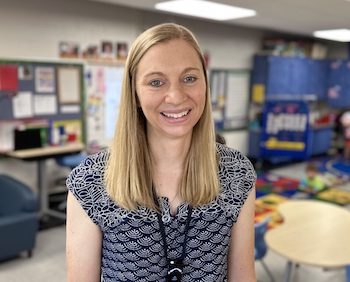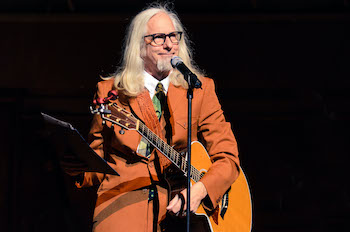By Jo Mathis / AAPS
Chris Trumpour was born and raised in Ann Arbor, where she and her older sister, Sarah, attended Eberwhite, Slauson, and Pioneer. As a high school student, she played basketball and ran track. She earned a scholarship to play basketball at Illinois State University where she studied special education.
After her playing career was over, Trumpour earned her degree as a Learning Behavior Specialist. She started her teaching career just two days after graduating, in a 10th-grade classroom for students with behavior disorders. When she decided to move back to Michigan to be closer to family and friends, she got a job at Westerman Preschool and Family Center.
During her early years with AAPS, Trumpour earned her master’s degree in Early Childhood Education. Recently, she added an elementary education endorsement to her teaching certificate. She has spent the majority of her 18 years in the Ann Arbor Public Schools as a special education teacher for students in preschool through fifth grade.
In 2021, she decided to begin a new professional journey and began teaching kindergarten at Allen Elementary, where she is today.
This is the third year retired teacher Nancy Kraft has volunteered in Trumpour’s classroom.
“I’ve been in the business for 45 years, and I’ve never seen anybody do it better than Chris does it,” she said. “She has the ability to connect with the kids while still getting the curriculum across. So she has both skills. She can be empathic and sympathetic while presenting curriculum the way the kids can learn it.”
Trumpour has two children: Alex (a fifth grader) and Maya (a second grader), who also attend Allen. Her husband is an Economics teacher and high school basketball coach at Belleville High School. They live in Ann Arbor with their two dogs, Ollie and Reese. When they are not in school, their family spends a lot of time playing, watching, and coaching sports.
Q: What inspired you to become a kindergarten teacher?
My interest in teaching began as a fourth grader at Eberwhite Elementary. My fourth grade teacher offered me the opportunity to spend time helping in another classroom during my recess time. I chose to go to a special education classroom where I was inspired by the teaching and learning that was taking place. It was this experience that inspired me to begin thinking of equity, inclusion, and belonging. Kindergarten has been a great match for me because I have the privilege of being a part of cultivating feelings of belonging and love for learning in some of our youngest learners.
Q: What’s your favorite part of teaching 5-6 year olds?
A: My favorite part of teaching 5- and 6-year-olds is their open-minded spirit. 5- and 6-year-olds are willing to try most things with an open mind. They accept and appreciate the things that make themselves and each other special and unique.

Q: How do you keep young children engaged and focused during lessons?
A: The best way to keep young children engaged and focused during lessons is to deliver instruction in a way that incorporates fun and play. One of my favorite parts of teaching young students is the collective joy they bring to learning. I have found that you can take just about any learning objective or goal and deliver it through joyful and playful learning experiences.

Q: What’s the biggest challenge you face in your role?
A: I think the biggest challenge kindergarten teachers face is ensuring every student gets exactly what they need each day. Students come to Kindergarten with a wide range of skills and experiences. They also become an extension of our family- we love and care for them deeply. As teachers, we stay up at night, thinking about each student and how we can give them all exactly what they need in a seven-hour day and beyond.

Q: What’s your approach to managing classroom behavior?
A: There are several components to my behavior management philosophy. One component is planning and implementing engaging instruction that incorporates student voice and choice. When students are engaged, they tend to display ideal learning and social behaviors.
The second component is the development of strong relationships with students and their families. When teachers and students understand one another’s strengths, interests, and challenges and
develop a shared trust and understanding, students are more likely to be intrinsically motivated to
be the best learners and classmates they can be.
The third component is intentional teaching, practicing, and coaching around social-emotional learning. This component creates a culture of belonging for all.
Q: What’s the most rewarding experience you’ve had as a teacher so far?
A: The most rewarding experience I have as a teacher is one that occurs in my classroom at some
point every year. It is the point at which our classroom community feels like an extended family
in which everyone knows they belong. This happens through months of relationship building
during which we get to know and understand one another’s strengths, interests, challenges,
family culture, home language, and all the components that make us special and unique. All of
these things are important because they make each student who they are- and who they are matters-
because everyone is important and everyone belongs.
Q: What do you like about teaching at AAPS, and at Allen in particular?
A: As a graduate of AAPS, I felt my experiences in the district prepared me well to take on the
world. I was excited to come back to serve this community as an educator. Allen in particular, is
a special place. We have a diverse population, supportive families, and the best staff around.
When I came to Allen four years ago, I was embraced with open arms. The staff and administration
work together with the common goal of supporting all learners to grow and succeed. I also love
teaching at the same school in which my own children attend.
Q: What are some of the funniest things your students have said?
A: Kindergarteners are really hilarious. They are honest and say exactly what is on their minds. I
have had a student call me “Mrs. Trumpet,” for most of the school year. My all-time favorite,
however, is when students tell me: “This is the best day of my life!” as a result of engaging in a
seemingly simple experience.

Q: What’s your favorite book to read to your students and why?
A: My favorite book to read to my students is “Jabari Jumps” or “Wilma Unlimited.” Both of these books get kids talking about bravery and persistence. These are two values that I emphasize throughout the school year. It’s amazing to hear kids say: “I’m brave like Jabari.” Or “I persisted like Wilma.”
Q: What are your favorite books, movies, and local restaurants?
A: My favorite books are biographies about people who have inspired me in one way or another. I don’t watch a lot of movies as I would definitely prefer to watch a sporting event. I love trying all of the different restaurants Ann Arbor has to offer. Currently, my favorite cuisine is Thai.
Q: If you weren’t a teacher, what other career would you consider?
A: When I was very young, I wanted to be a zoo keeper who studied and cared for apes. While I would still find that interesting, if I weren’t a teacher, I probably would consider a career as a college basketball or track coach.
Q: How do you spend your summers?
A: The best part of summer is spending lots of time with my own children. I love coaching and watching them play sports.
Q: Advice for first-year teachers?
A: When I was a first-year teacher, I had a mentor who would say: “Find the smile.” It became my mission to find the smile in every student every day. I have found great joy in my classroom in living by this piece of advice and would happily pass it along to another first-year teacher.
Q: What are your favorite memories of attending kindergarten at Eberwhite In 1988?
A: My favorite memories of attending kindergarten at Eberwhite in 1988 were walking to school with my older sister, learning the letter of the week, and playing in the classroom house area with friends.
Q: What personality traits are essential to successfully teach kindergarten?
A: Kindergarten teachers should be compassionate extremely flexible, and fun. If you are not
having fun in kindergarten, you’re not doing it right!








